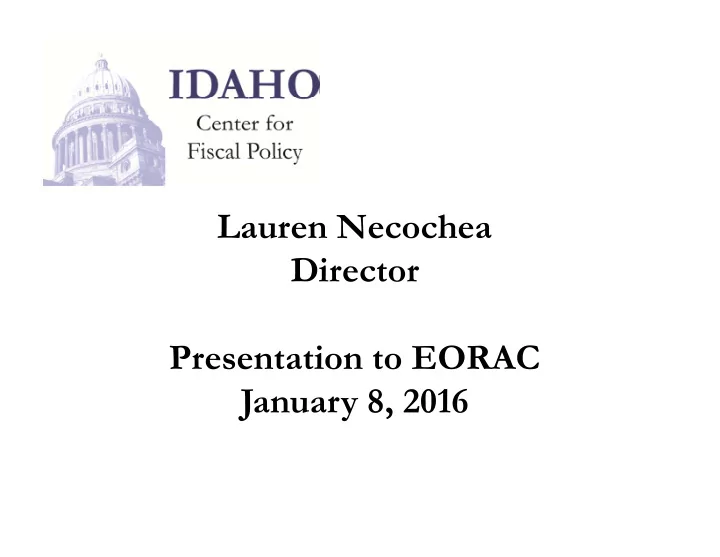

Lauren Necochea Director Presentation to EORAC January 8, 2016
We believe in making the right investments today with our public dollars so that our state will thrive tomorrow. And we believe that the more complete information improves policy decisions.
Key Questions • How is Idaho’s economy trending? • How do urban/rural dynamics affect Idaho’s economic performance? • How is Idaho’s economy positioned compared to the rest of the nation?
Idaho’s Economy News to celebrate: • Inflation ‐ adjusted per ‐ capita personal income is growing • New jobs are being created • Unemployment is low
Business profits and wages growing Business profits grew by 11.4% between 2013 and 2014 (largest gain in the nation). Wages are also growing, at 4.9% (11 th in the nation). From FY14 to FY15, corporate income tax collections shot by up 14.1%. Individual income tax collections increased by 10.6% (both net of refunds).
Recent Personal Income Gains Driven By Agriculture Farm personal income in Idaho grew from $2.77 billion in 2013 to $3.32 billion in 2014.
Percentage of Children Who Live in Poverty 25% 20% 15% Idaho 10% U.S. 5% 0% 2000 2001 2002 2003 2004 2005 2006 2007 2008 2009 2010 2011 2012 2013 2014 Source: U.S. Census Data, provided by KIDS COUNT
Percentage of Children Who Are Low ‐ Income (less than 200% Federal Poverty Level) 60% 50% 40% 30% Idaho U.S. 20% 10% 0% Source: U.S. Census Data, provided by KIDS COUNT
Poverty Rates for Seniors (65+) 2005 2014 Idaho 8.5% 9.5% U.S. 9.9% 9.5% Source: American Community Survey 1 ‐ Year Estimates
Urban vs. Rural Economies
2010-2013
Population Change Rural Idaho Urban Idaho Total Population (2010) 544,000 1,023,000 Total Population (2014) 548,000 1,086,000 Population change, 2010-2014 (%) 1% 6% Net migration rate, 2010-2014 (%) -2% 3% Natural change rate, 2010-2014 (%) 3% 3% Source: Rural Idaho Since the Recession . August, 2015. McClure Center for Public Policy Research, University of Idaho
Unemployment Rate Rural Idaho Urban Idaho U.S. 3.3% 2.9% 4.6% Pre-recession (2007) 8.4% 9.0% 9.3% End of recession (2009) 5.1% 4.7% 6.2% Current (2013) Source: Rural Idaho Since the Recession . August, 2015. McClure Center for Public Policy Research, University of Idaho
Per Capita Income (Adjusted for Inflation) Rural Idaho Urban Idaho U.S. Pre-recession (2007) $34,329 $38,658 $44,721 End of recession (2009) $32,522 $35,414 $42,760 Current (2013) $35,805 $36,320 $44,765 Source: Rural Idaho Since the Recession . August, 2015. McClure Center for Public Policy Research, University of Idaho
Average wage per job (Adjusted for inflation) Rural Idaho Urban Idaho U.S. Pre-recession (2007) $33,762 $40,701 $39,919 End of recession (2009) $33,978 $39,873 $38,915 Current (2013) $34,080 $39,511 $39,009 Source: Rural Idaho Since the Recession . August, 2015. McClure Center for Public Policy Research, University of Idaho
Key Takeaways • Since 1990, rural parts of Idaho have had weaker economic performance, as measured by unemployment rates, average wages, and per capita income. However, since the recession, gaps have narrowed. – In 2007, per capita income in rural Idaho was $4,329 lower than in urban Idaho. By 2013, the gap had decreased to $515. • Since job growth began in 2010, the number of rural jobs has increased 2.6%, compared to an increase of 4.8% for urban jobs. Source: Rural Idaho Since the Recession . August, 2015. McClure Center for Public Policy Research, University of Idaho
How is Idaho’s economy positioned compared to the rest of the nation?
America's Top States for Business 2014 by CNBC Idaho's Rankings (where 1 is best) Cost of Doing Business 8 Economy 42 Infrastructure 34 Workforce 8 Quality of Life 16 Technology & Innovation 41 Business Friendliness 6 Education 45 Cost of Living 11 Access to Capital 21 Overall 16
Weak Relationship Between Education and Wages 30 Years Ago, 1979 $28 AK $26 (inflation adjusted, 2012 $) $24 Median Hourly Wage $22 WA MI $20 WY IL CA OR MD OH CO NJ WV NY WI MN CT $18 PA DE UT NV HI MO MT IN OK AZ IA ID KY VA NM KS TX RI NH LA $16 AL NE ND GA MA TN VT FL NC ME SC SD $14 AR MS $12 8% 10% 12% 14% 16% 18% 20% 22% 24% Percent of Workforce with Bachelor's Degree
Strong Relationship Between Education and Wages, 2012 $21 CT NJ $20 MD AK Median Hourly Wage $19 MA NH MN VA WA CO $18 NY DE CA WY IL OR RI HI PA $17 VT ND WI MI MO FL KS $16 GA IA ME OH UT WV AZ ID ID IN NM OK AL TX NC NE NV LA SD $15 KY SC MS TN AR MT $14 $13 20% 25% 30% 35% 40% 45% Percent of Workforce with Bachelor's Degree
Average Monthly Earnings from Q4 in 2014 $6,000 $5,000 $4,000 $3,000 $2,000 $1,000 $0 Less than high High school or Some college or Bachelor's school equivalent, no Associate degree or college degree advanced degree Source: U.S. Census Data
Educational Attainment: Percentage with an Associate’s Degree or Higher Idaho U.S. 36% 40% Working Age Adults (25-64)
Educational Attainment: Percentage with an Associate’s Degree or Higher Idaho U.S. Young Adults (25-34) 33% 42% Working Age Adults (25-64) 36% 40%
Report: What Do the Best Entrepreneurs Want? Endeavor Insight conducted surveys and interviews with 150 founders from some of the fastest ‐ growing companies in the U.S.
Key Lessons: 1) Founders of fast ‐ growing firms usually decide where to live based on personal connections and quality of life factors many years before they start firms 2) They value a pool of talented employees more than any other business ‐ related resource that cities can offer. 3) Access to customers and suppliers is the second most valuable business ‐ related resource
Questions? Contact information: Lauren Necochea lnecochea@jannus.org 208-388-1014
Recommend
More recommend